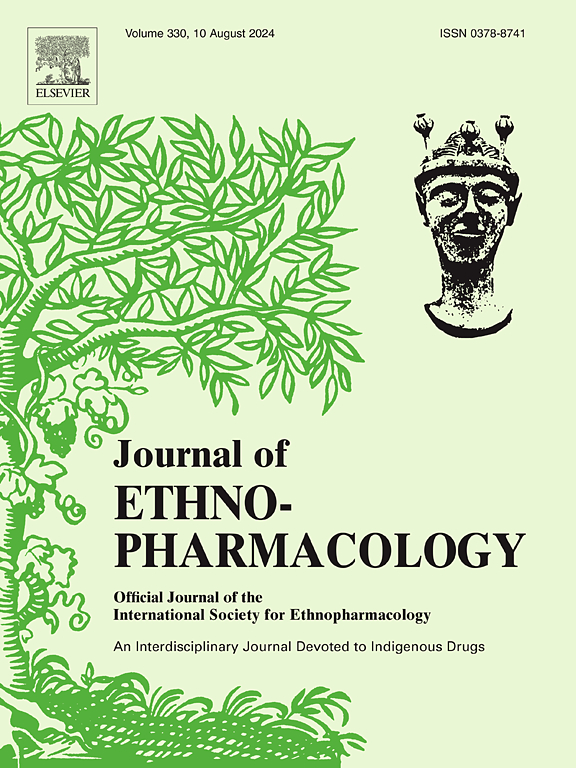灵芝孢子油通过抑制类二十烷代谢途径调节肝癌h22小鼠免疫,抑制肿瘤生长。
IF 5.4
2区 医学
Q1 CHEMISTRY, MEDICINAL
引用次数: 0
摘要
民族药理学相关性:灵芝孢子油(GLSO)是一种众所周知的有益免疫增强的保健品,它源于一种药用真菌:灵芝(Curtis) P. Karst。灵芝作为补品在中国已有2000多年的历史。现代药理研究表明,它具有免疫调节、降血糖、降血脂、抗氧化、抗衰老、抗肿瘤等作用。研究目的:本研究考察GLSO对肝癌h22小鼠的免疫增强能力,旨在揭示GLSO抗肿瘤作用的潜在机制。材料与方法:采用UHPLC-Q-Orbitrap液相色谱法对GLSO成分进行鉴定。建立小鼠H22细胞皮下移植瘤模型,并预先给药GLSO。根据肿瘤大小、肿瘤生长曲线、肿瘤抑制率和Ki67水平评价GLSO对h22荷瘤小鼠的抗肿瘤作用。通过检测T淋巴细胞和B淋巴细胞增殖、延迟性超敏反应、NK细胞杀伤活性、巨噬细胞吞噬活性和巨噬细胞极化、细胞因子水平和CD69分子表达来评估免疫功能。通过网络药理学分析、流式细胞术和Pro-DIA定量蛋白质组学分析探讨GLSO抑制肿瘤的潜在机制,并通过WB和RT-PCR验证。结果:从GLSO中鉴定出三萜类、脂肪酸和酯类等38个化合物。GLSO处理小鼠的肿瘤初始体积和最终体积较小,Ki67表达较低,GLSO处理可预防肿瘤发生,抑制肿瘤生长。GLSO可促进h22荷瘤小鼠免疫器官的宏观调控,增强巨噬细胞吞噬、NK细胞的细胞毒性、T细胞和B细胞的增殖活性,延缓型超敏反应,减少M2巨噬细胞的产生,调节细胞因子的分泌。网络药理学分析和流式细胞术结果显示,GLSO治疗可能对改善肿瘤免疫微环境有有益作用。蛋白质组学分析显示,GLSO抑制类二十烷代谢途径,WB和RT-PCR再次验证了这些结果。结论:本研究支持GLSO增强h22肝癌小鼠免疫功能,并首次报道GLSO通过抑制类二十烷代谢途径抑制肿瘤生长。本文章由计算机程序翻译,如有差异,请以英文原文为准。

Ganoderma lucidum spore oil modulates immunity in hepatoma H22-bearing mice and restricts tumor growth by inhibiting eicosanoid metabolism pathway
Ethnopharmacological relevance
Ganoderma lucidum spore oil (GLSO) is a well-known health product that is beneficial for immuno-enhancement, which stems from a medicine fungus: Ganoderma lucidum (Curtis) P. Karst. Ganoderma lucidum has been used as tonic in China for more than 2000 years. Modern pharmacological studies have shown that it has effects with immunomodulatory, hypoglycemic, hypolipidemic, anti-oxidation, anti-aging and anti-tumor.
Aim of the study
The immuno-enhancement ability of GLSO in hepatoma H22-bearing mice was investigated in this study, and our work aimed to reveal the potential mechanisms of the antitumor efficacy of GLSO.
Materials and methods
The GLSO components were identified via UHPLC-Q-Orbitrap HRMS. A H22 cell subcutaneously transplanted tumor mouse model was constructed, and GLSO was preadministered. The antitumor efficacy of GLSO in hepatoma H22-bearing mice was evaluated according to tumor size, tumor growth curves, tumor inhibition rates and Ki67 level. T and B lymphocyte proliferation, delayed hypersensitivity, NK cell killing activity, macrophage phagocytotic activity and macrophage polarization, cytokine levels and CD69 molecule expression were detected to estimate immune function. Network pharmacology analysis, flow cytometry and Pro-DIA quantitative proteomics analysis were performed to investigate the potential mechanism of GLSO in tumor inhibition, which was verified by WB and RT-PCR.
Results
Thirty-eight compounds including triterpenoids, fatty acids and esters, were identified from GLSO. Mice treated with GLSO showed the smaller initial and final tumor volumes and lower Ki67 expression, GLSO treatment could prevented tumor occurrence and inhibited tumor growth. Treatment with GLSO promoted a strong immune response including macroregulation in immune organs, enhancement of macrophage phagocytosis, NK cell cytotoxicity,T cells and B cells proliferation activity, delayed-type hypersensitivity reaction, reducing the production of M2 macrophages and regulation of cytokine secretion in hepatoma H22-bearing mice. Network pharmacology analysis and flow cytometry results showed that treatment with GLSO might have beneficial effects on improving the tumor immune microenvironment. Proteomics analysis showed that GLSO inhibited eicosanoid metabolism pathway, WB and RT-PCR re-check these results.
Conclusion
These findings support that GLSO enhances immunity in hepatoma H22-bearing mice and we first report that GLSO restricts tumor growth by inhibiting eicosanoid metabolism pathway.
求助全文
通过发布文献求助,成功后即可免费获取论文全文。
去求助
来源期刊

Journal of ethnopharmacology
医学-全科医学与补充医学
CiteScore
10.30
自引率
5.60%
发文量
967
审稿时长
77 days
期刊介绍:
The Journal of Ethnopharmacology is dedicated to the exchange of information and understandings about people''s use of plants, fungi, animals, microorganisms and minerals and their biological and pharmacological effects based on the principles established through international conventions. Early people confronted with illness and disease, discovered a wealth of useful therapeutic agents in the plant and animal kingdoms. The empirical knowledge of these medicinal substances and their toxic potential was passed on by oral tradition and sometimes recorded in herbals and other texts on materia medica. Many valuable drugs of today (e.g., atropine, ephedrine, tubocurarine, digoxin, reserpine) came into use through the study of indigenous remedies. Chemists continue to use plant-derived drugs (e.g., morphine, taxol, physostigmine, quinidine, emetine) as prototypes in their attempts to develop more effective and less toxic medicinals.
 求助内容:
求助内容: 应助结果提醒方式:
应助结果提醒方式:


